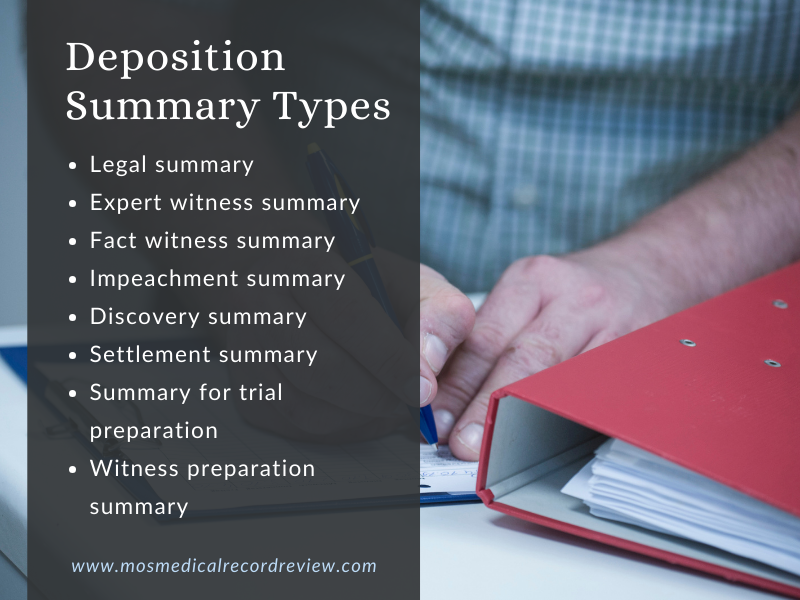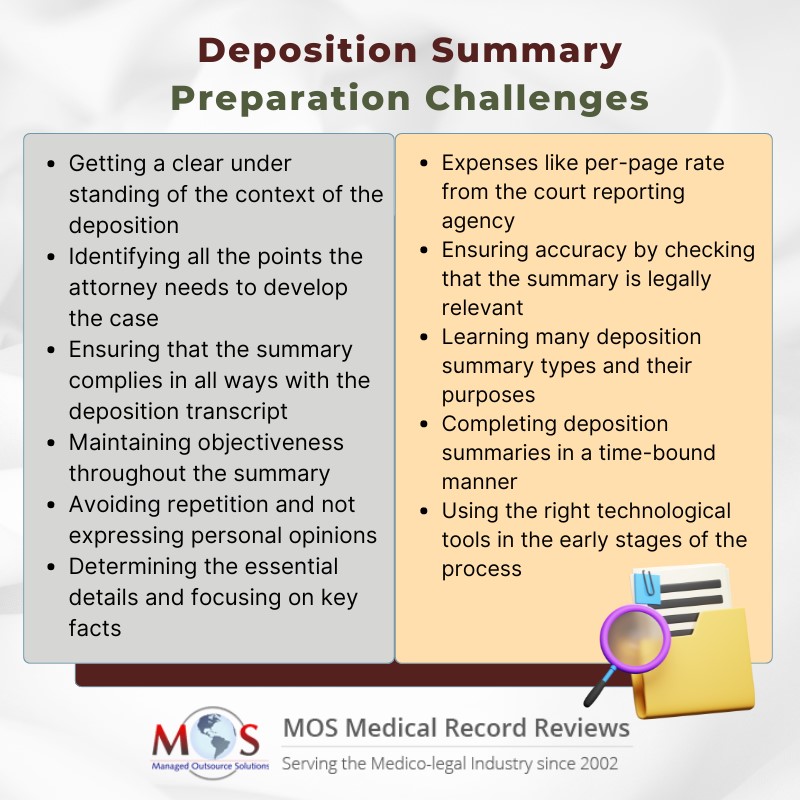Deposition summaries are concise and organized documents that capture key points from a deposition. Lawyers mainly require a deposition summary to effectively communicate the crucial details contained in a deposition transcript.
The average deposition transcript has hundreds of pages of transcribed talks, making it quite hard for an attorney to read and retain everything. Summaries of depositions become important at this point. One of the important medical records services that attorneys can effectively use is the preparation of deposition summaries. Depositions give both the plaintiff and the defense side the chance to learn more about potential witnesses and the topics they might be able to discuss during a trial. An experienced medical chart review company can create accurate and timely deposition summaries for attorneys. Both in court and throughout the pretrial phase, these summaries are helpful. The type and content of a deposition summary can vary based on the purpose and audience.
MOS Medical Record Reviews specializes in providing accurate deposition summary services.

8 Types of Deposition Summaries
Here are eight types of deposition summaries:
- Legal summary: This summary provides a comprehensive overview of the questions asked and the answers given during a deposition. It includes key points, admissions, denials, and any noteworthy statements made by the deponent.
- Expert witness summary: It focuses on the expert’s opinions, methodologies, and qualifications and summarizes the expert’s responses to questions related to their area of expertise. It also emphasizes key points that may be crucial for trial preparation.
- Fact witness summary: This summary type highlights the information provided by the witness. It summarizes the witness’s account of events or details relevant to the case and may include any contradictions in the witness’s testimony.
- Impeachment summary: It highlights statements made during the deposition for impeachment purposes. Also, this summary emphasizes inconsistencies between the deposition testimony and other statements made by the deponent.
- Discovery summary: This type focuses on gathering information and evidence available during the discovery phase of litigation. It summarizes relevant details and admissions that can be useful in building a case or formulating legal strategies.
- Settlement summary: This summary type emphasizes points that could be beneficial for negotiating a settlement. It includes information that might influence the opposing party’s willingness to settle.
- Summary for trial preparation: It streamlines the deposition into a format that may be used at trial and underlines crucial details that lawyers might wish to emphasize during cross-examination or presentation.
- Witness preparation summary: Along with helping to prepare a witness for trial, this summary also emphasizes potential areas of questioning and prepares the witness for possible challenges.
Experienced medical record review companies can tailor the deposition summary to meet the specific needs of the case and the intended audience, whether it be legal teams, clients, or other stakeholders involved in the legal process. Judges also use these summaries to prepare a summing up statement or use it during the trial. Jurors on their part, also may prefer a deposition summary to a lengthy written testimony.
Ready to uncover valuable legal insights?
Get your custom deposition summary now!
Major Challenges in Preparing a Deposition Summary
- Volume of information: Depositions are not clear narratives. These contain a vast amount of information, including witness testimonies, exhibits, and transcripts, making it difficult to extract the essential points. This sheer volume of information makes it difficult to identify the key points relevant to the case and separate them from the background noise.
- Complexity of legal language: Depositions often contain complex legal terminology and nuanced discussions, requiring a deep understanding of legal concepts to accurately summarize. Even a single misinterpreted legal term or inaccurately summarized conversation can have significant consequences for the case.
- Determining the essential details: This can be rather challenging. Attorneys and paralegals may find it difficult to find the right balance of summary and specificity and focus on the important facts. Extracting the most relevant information from lengthy depositions while omitting irrelevant details is crucial for providing concise and impactful summaries. To write a good summary, one needs to fully comprehend the basis of the complaint. It is important to isolate particular statements/allegations and see whether they appear in the transcript.
- Time constraints: Summarizing depositions is a time-consuming process, which involves scheduling meetings with the witnesses, recording their statements, cross-checking the testimonials, discovering evidence and word-by-word conversion of the verbal content. Attorneys may require summaries within tight deadlines, necessitating efficient summarization processes to meet their needs promptly.
- Objectivity and accuracy: Summaries must remain objective and accurately reflect the content of the deposition, avoiding any bias or misinterpretation that could affect legal proceedings. They should also be well-organized and presented in a format that is easily digestible for attorneys, ensuring clarity and readability.
- Legal strategy alignment: The summary should align with the attorney’s legal strategy, highlighting information that supports their case while identifying potential challenges or contradictions in witness testimonies.
- Lack of technology: Knowing the right technical tools during the early stages of the litigation process makes the pre-trial process seamless. Managing a litigation case from beginning to end is a difficult task. Gaining mastery of complicated fact patterns, chronicling evidence, and analyzing deposition testimony from complex and document-intensive transcripts is easier with the assistance of the right software. Innovative technology must penetrate the process to facilitate pre-trial analysis and collaboration. Technological tools can streamline the litigation process by collaborating and sharing notes about case-related evidence and documents.
Overcoming these challenges requires proper attention to detail, legal expertise, and effective communication between the summarizer and the attorney.
Compressing lengthy transcripts to deposition summaries can be efficiently done with the assistance of a medical record review company. Professional companies prepare summaries with the support of skilled and trained professionals who understand and have experience in all areas of law.
FAQs
What types of cases can benefit from deposition summary preparation?
Summary of deposition transcripts is crucial for legal cases across various practice areas, including civil litigation, personal injury, employment disputes, family law matters, and more. Regardless of the case type or complexity, these summaries help attorneys simplify the review process and extract relevant information efficiently.
What is the process involved?
Experienced legal professionals review deposition transcripts, extract relevant information, and reduce it into a concise and organized format. The process involves thorough analysis, identification of key testimony, summarization of crucial points, and formatting according to the attorney’s preferences or case requirements.
How can I ensure the accuracy and quality of summaries?
When selecting a service provider, it’s essential to choose a reputable firm with a track record of delivering accurate and high-quality summaries. Look for providers who employ experienced legal professionals, have stringent quality control measures in place, and offer opportunities for attorney feedback and customization to ensure the accuracy and efficacy of the summaries.
Can deposition summary preparation services accommodate specific formatting preferences or case requirements?
Yes, professional companies understand the importance of tailoring summaries to meet the unique needs of each case and attorney. They should be able to accommodate specific formatting preferences, incorporate case-specific terminology or legal nuances, and adhere to any confidentiality requirements or litigation guidelines specified by the attorney or law firm.
Got more queries on summary preparation or any other medical review services?





